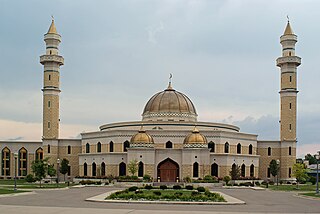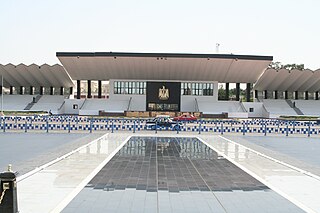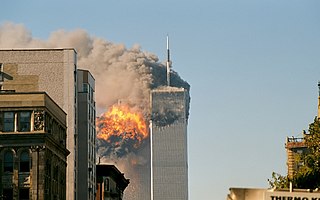
Hezbollah is a Lebanese Shia Islamist political party and militant group, led since 1992 by its Secretary-General Hassan Nasrallah. Hezbollah's paramilitary wing is the Jihad Council, and its political wing is the Loyalty to the Resistance Bloc party in the Lebanese Parliament.
War against Islam is a term used to describe a concerted effort to harm, weaken or annihilate the societal system of Islam, using military, economic, social and cultural means, or means invading and interfering in Islamic countries under the pretext of the war on terror, or using the media to create a negative stereotype about Islam. The alleged perpetrators are non-Muslims, particularly the Western world and "false Muslims", in collusion with political actors in the Western world. While the themes of the "War against Islam" mostly concern general issues of societal transformations in modernization and secularization as well as current international power politics, the Crusades are often given as its starting point.

Islam is the third largest religion in the United States (1%), behind Christianity and Judaism, and equaling the shares of Buddhism and Hinduism. A 2017 study estimated that 1.1% of the population of United States are Muslim. In 2017, twenty states, mostly in the South and Midwest, reported Islam to be the largest non-Christian religion. In 2020, the U.S. Religion Census found there to be 4.45 million Muslim Americans, or roughly 1.3% of the population.

Yusuf al-Qaradawi was an Egyptian Islamic scholar based in Doha, Qatar, and chairman of the International Union of Muslim Scholars. His influences included Ibn Taymiyya, Ibn Qayyim, Sayyid Rashid Rida, Hassan al-Banna, Abul Hasan Ali Hasani Nadwi, Abul A'la Maududi and Naeem Siddiqui. He was best known for his programme الشريعة والحياة, al-Sharīʿa wa al-Ḥayāh, broadcast on Al Jazeera, which had an estimated audience of 40–60 million worldwide. He was also known for IslamOnline, a website he helped to found in 1997 and for which he served as chief religious scholar.

al-Jamāʻah al-islāmīyah, is an Egyptian Sunni Islamist movement, and is considered a terrorist organization by the United Kingdom and the European Union.al-Jamāʻah al-islāmīyah was removed from the list of Foreign Terrorist Organizations by the United States in May 2022. The group was dedicated to the overthrow of the Egyptian government and replacing it with an Islamic state; the group has committed to peaceful means following the coup that toppled Mohamed Morsi.
Islamic terrorism refers to terrorist acts with religious motivations carried out by fundamentalist militant Islamists and Islamic extremists.
Criticism of the war on terror addresses the morals, ethics, efficiency, economics, as well as other issues surrounding the war on terror. It also touches upon criticism against the phrase itself, which was branded as a misnomer. The notion of a "war" against "terrorism" has proven highly contentious, with critics charging that participating governments exploited it to pursue long-standing policy/military objectives, reduce civil liberties, and infringe upon human rights. It is argued by critics that the term war is not appropriate in this context, since there is no identifiable enemy and that it is unlikely international terrorism can be brought to an end by military means.

United Nations Security Council resolution 1566, adopted unanimously on 8 October 2004, after reaffirming resolutions 1267 (1999), 1373 (2001) and 1540 (2004), the Council condemned terrorism as a serious threat to peace and strengthened anti-terrorism legislation.
Opposition to the War in Afghanistan (2001–2021) stemmed from numerous factors, including the view that the United States invasion of Afghanistan was illegal under international law and constituted an unjustified aggression, the view that the continued military presence constituted a foreign military occupation, the view that the war did little to prevent terrorism but increased its likelihood, and views on the involvement of geo-political and corporate interests. Also giving rise to opposition to the war were civilian casualties, the cost to taxpayers, and the length of the war to date.
Martyrdom videos are video recordings, generally from Islamist jihadists who are about to take part in a suicide attack and expect to die during their intended actions. They typically include a statement by the person preparing to be a martyr for their cause. They can be of amateur or professional quality and often incorporate text, music, and sentimental clips. The people in these videos typically sit or stand in front of a black Islamic flag, in their explosive-rigged vehicles, or media or other symbol of their allegiance. Suicide bombers considered themselves religiously justified by sharia and consider themselves to be shahid.

Terrorism in Egypt in the 20th and 21st centuries has targeted the Egyptian government officials, Egyptian police and Egyptian army members, tourists, Sufi Mosques and the Christian minority. Many attacks have been linked to Islamic extremism, and terrorism increased in the 1990s when the Islamist movement al-Gama'a al-Islamiyya targeted high-level political leaders and killed hundreds – including civilians – in its pursuit of implementing traditional Sharia law in Egypt.
Istishhad is the Arabic word for "martyrdom", "death of a martyr", or "heroic death"..

A suicide attack is a form of attack in which the perpetrators accept their own death as an inevitable consequence of their chosen method. Often associated with terrorism or military conflicts, suicide attacks are a form of murder–suicide. Suicide attacks often involve explosives, in which case they may be referred to as suicide bombings; in the context of terrorism, suicide attacks are also commonly referred to as suicide terrorism. Although generally not regulated under international law by themselves, many suicide attacks violate international laws of war such as perfidy or targeting civilians.

The September 11 attacks were condemned by world leaders and other political and religious representatives and the international media, as well as numerous memorials and services all over the world. The attacks were widely condemned by the governments of the world, including those traditionally considered hostile to the United States, such as Cuba, Iran, Libya, and North Korea. However, in a few cases celebrations of the attacks were also reported, and some groups and individuals accused the United States in effect of bringing the attacks on itself. These reports have been uncorroborated and many have been linked to unsubstantiated conspiracy theories.

The Fatwa on Terrorism and Suicide Bombings is a 600-page, 512 page Islamic book by scholar Muhammad Tahir-ul-Qadri which demonstrates from the Quran and Sunnah that terrorism and suicide bombings are unjust and evil, and thus un-Islamic. The book was published in London. The English edition was published in the UK by Minhaj-ul-Quran Publications. Qadri released the book on 2 March 2010.
The use of politically and religiously-motivated violence dates back to the early history of Islam. Islam has its origins in the behavior, sayings, and rulings of the Islamic prophet Muhammad, his companions, and the first caliphs in the 7th, 8th, and 9th centuries CE. Mainstream Islamic law stipulates detailed regulations for the use of violence, including corporal and capital punishment, as well as regulations on how, when, and whom to wage war against.
Takfir wal-Hijra, was the popular name given to a radical Islamist group Jama'at al-Muslimin founded by Shukri Mustafa which emerged in Egypt in the 1960s as an offshoot of the Muslim Brotherhood. Although the group was crushed by Egyptian security forces after it murdered an Islamic scholar and former government minister in 1977, it is said to have "left an enduring legacy" taken up by some Islamist radicals in "subsequent years and decades."
Moderate Islam and moderate Muslim are labels that are used within counterterrorism discourse as the complement of "Islamic extremism" and imply that supporting Islamic terrorism is the characteristic of a "radical" faction within Islam, and a "moderate" faction of Muslims denounces extremist violence such as Islamic terrorism, militant jihadism and radical Islamism.
Several notable opinion polls have been undertaken on Islam and related topics, including fundamentalism, and Islamic terrorism. Polls have interviewed both Muslim respondents and other groups.









